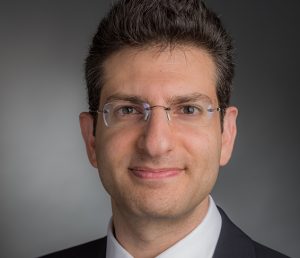
Investigator, Hale Family Center For Pancreatic Cancer Research
Division Of Genetics, Brigham And Women’s Hospital
Division Of Gastroenterology, Brigham And Women’s Hospital
Division Of Genetics And Prevention, Dana-Farber Cancer Institute
Assistant Professor of Medicine, Harvard Medical School
Harvard-MIT Program In Health Sciences And Technology
Bio Research Interests Key Publications Nissim Lab Website
Bio
Dr. Sahar Nissim, MD, PhD is a cancer geneticist at the Dana-Farber Cancer Institute and a gastroenterologist at Brigham And Women’s Hospital. He is a practicing clinician at the Dana-Farber Cancer Institute Center For Cancer Genetics And Prevention where he specializes in the care of individuals with a strong family history of pancreatic cancer. He also runs an independent laboratory focused on discovery and characterization of germline determinants of pancreatic cancer.
Dr. Nissim’s work reflects an intersection of PhD training in genetics and developmental biology at Harvard Medical School with Dr. Cliff Tabin, post-doctoral training in innovative zebrafish cancer models with Dr. Wolfram Goessling, and clinical training in internal medicine and gastroenterology at Brigham And Women’s Hospital and hereditary cancer syndromes at the Dana-Farber Cancer Institute. Dr. Nissim joined the faculty of Harvard Medical School and Dana-Farber Cancer Institute in 2019.
Research Interests
The Nissim Lab is interested in a number of fundamental questions with translational implications for pancreatic cancer:
- What are the signaling and epigenetic processes that maintain normal identity of the acinar cell, the cell-of-origin of pancreatic cancer? How are these processes disrupted by cancer-initiating mutations, obesity, and pancreatitis? And, can we develop an interception strategy for pancreatic cancer by targeting these processes to reinforce normal cell identity? Interception seeks to target precursor lesions before they can progress to more heterogeneous and intractable disease. Nothing like this currently exists but would be transformative for the field. Towards this goal, we are leveraging cutting-edge single cell and spatial transcriptomics and epigenomics methods, mouse models and human acinar cultures, and CRISPR-based functional approaches.
- What are the causes of hereditary pancreatic cancer syndromes? Families with as many as five cases of pancreatic cancer are suspicious for a heritable etiology, but the genetic basis is not known in most families. While rare, these families offer precious insights into why pancreatic cancer forms with broad translational implications. Beginning with such families I encounter in my DFCI clinic, the lab seeks to discover and characterize new causes of hereditary pancreatic cancer.
- In one pancreatic cancer family, we discovered a rare inherited mutation in the gene RABL3 (Nissim et al., Nature Genetics, 2019). We found that the mutation alters the trafficking of KRAS to the plasma membrane where it must be located for downstream oncogenic activity. Our team is now evaluating whether we can target this process to block KRAS trafficking to the membrane as a therapeutic strategy for pancreatic cancer.
Key Publications
Aney KJ*, Jeong WJ*, Vallejo AF, Burziak C, Chen E, Wang A, Koak P, Wise K, Jensen K, Pe’er D, Dougan SK, Martelotto L, Nissim S. Novel Approach for Pancreas Transcriptomics Reveals the Cellular Landscape in Homeostasis and Acute Pancreatitis. Gastroenterology. PMID: 38325760.
Chittenden A, Haraldsdottir S, Chen E, Nissim S. Germline Testing for Individuals with Pancreatic Adenocarcinoma and Novel Genetic Risk Factors. Hematol Oncol Clin North Am. 2022; 36(5): 943-960. PMID: 36265992
Aney KJ, Nissim S. More than acinar identity? A novel cystic phenotype suggests broader roles for NR5A2 in pancreatic cancer. Journal of Pathology. 2021. PMID: 33448017.
Nissim S, Leshchiner I, Mancias JD, Greenblatt MB, Maertens O, Cassa CA, Rosenfeld JA, Cox AG, Hedgepeth J, Wucherpfennig JI, Kim AJ, Henderson JE, Gonyo P, Brandt A, Lorimer E, Unger B, Prokop JW, Heidel JR, Wang XX, Ukaegbu CI, Jennings BC, Paulo JA, Gableske S, Fierke CA, Getz G, Sunyaev SR, Wade Harper J, Cichowski K, Kimmelman AC, Houvras Y, Syngal S, Williams C, Goessling W. Mutations in RABL3 alter KRAS prenylation and are associated with hereditary pancreatic cancer. Nat Genet. 2019; 51(9):1308-14. PMID: 31406347.
Cox AG, Tsomides A, Kim AJ, Saunders D, Hwang KL, Evason KJ, Heidel J, Brown KK, Yuan M, Lien EC, Lee BC, Nissim S, Dickinson B, Chhangawala S, Chang CJ, Asara JM, Houvras Y, Gladyshev VN, Goessling W. Selenoprotein H is an essential regulator of redox homeostasis that cooperates with p53 in development and tumorigenesis. Proc Natl Acad Sci U S A. 2016; 113(38):E5562-71. PMID: 27588899.
Nissim S*, Weeks O*, Talbot JC, Hedgepeth JW, Wucherpfennig J, Schatzman-Bone S, Swinburne I, Cortes M, Alexa K, Megason S, North TE, Amacher SL, Goessling W. Iterative use of nuclear receptor Nr5a2 regulates multiple stages of liver and pancreas development. Dev Biol. 2016; 418(1):108-23. PMID: 27474396.
Cox AG, Hwang KL, Brown KK, Evason K, Beltz S, Tsomides A, O’Connor K, Galli GG, Yimlamai D, Chhangawala S, Yuan M, Lien EC, Wucherpfennig J, Nissim S, Minami A, Cohen DE, Camargo FD, Asara JM, Houvras Y, Stainier DYR, Goessling W. Yap reprograms glutamine metabolism to increase nucleotide biosynthesis and enable liver growth. Nat Cell Biol. 2016; 18(8):886-96. PMID: 27428308.
Mancias JD, Pontano Vaites L, Nissim S, Biancur DE, Kim AJ, Wang X, Liu Y, Goessling W, Kimmelman AC, Harper JW. Ferritinophagy via NCOA4 is required for erythropoiesis and is regulated by iron dependent HERC2-mediated proteolysis. Elife. 2015; 4. PMID: 26436293.
Nissim S, Sherwood RI, Wucherpfennig J, Saunders D, Harris JM, Esain V, Carroll KJ, Frechette GM, Kim AJ, Hwang KL, Cutting CC, Elledge S, North TE, Goessling W. Prostaglandin E2 regulates liver versus pancreas cell-fate decisions and endodermal outgrowth. Dev Cell. 2014; 28(4):423-37. PMID: 24530296.
Nissim S, Idos GE, Wu B. Genetic markers of malignant transformation in intraductal papillary mucinous neoplasm of the pancreas: a meta-analysis. Pancreas. 2012; 41(8):1195-205. PMID: 22750975.

